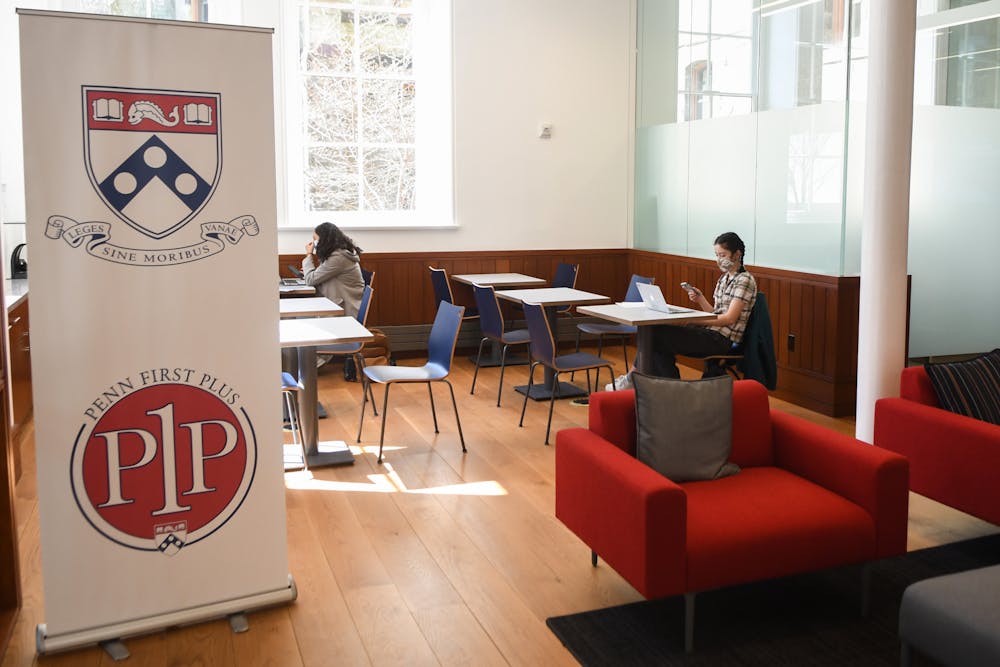Penn suddenly suspended an initiative that helped hundreds of students afford their course materials, causing alarm among first-generation, low-income students.
In late August, Penn First Plus announced online that it had ended its Course Materials Access Code Initiative for the fall semester. The initiative — which arose during remote learning in the fall of 2020 as a partnership with Penn's undergraduate schools and financial aid office — provided free access codes for materials in "key gateway courses across a variety of fields." It grew to support approximately 350 students per semester, according to the announcement.
Three students with whom The Daily Pennsylvanian spoke said that, despite some issues, the access codes were a helpful resource. They said that the announcement of the initiative's discontinuation — which came days before the fall semester began — will create financial challenges.
College sophomore and Penn First Board Mentorship Chair Bill Chen said that the codes were particularly helpful when he was taking ECON 0100: "Introduction to Micro Economics" and other introductory courses.
“Without [the codes], it would have placed a financial burden on me to pay out of pocket, especially since you are not able to do well in your classes or complete your work if you don’t have access to those materials," Chen, who is also a photographer at the DP, said.
FGLI Dean's Advisory Board Co-Liaison and College junior Lex Gilbert said she was surprised that students received no warning ahead of the end of the initiative.
"We budget for stuff because we don’t always just have money to buy anything, anytime that we want,” Gilbert said.
In the announcement, P1P said that the Access Code Initiative was a helpful resource throughout the pandemic, but it had decided to pursue “more cultural change and data as they relate to course materials in the curriculum.”
RELATED:
Penn First Plus announced new faculty co-director to encourage inclusive teaching
An overview of Penn's mental health, accessibility, and FGLI resources for students
Elaborating on this cultural change, P1P Executive Director Marc Lo said that he hopes to “normalize transparency” when it comes to letting students know what material they will actually use in classes as early as possible. He added that having this information allows students and the Office of Financial Aid to make informed decisions about their resources.
For the current semester, P1P has encouraged faculty to list their courses in the Penn Bookstore to help the University's financial aid office collect a more accurate estimate of the cost of educational supplies for students going forward. Lo said that this includes physical books, electronic books, homework platforms, and any required software.
Here, Lo said that the goal is to create a more accurate cost estimate for Penn administration and students.
P1P also wrote in the announcement that the existence of free access codes for certain courses had too much influence on a student’s course selection, and there was too much variety in required materials across different sections of the same course for materials to continue to be provided to students for free.
"Students should feel as though they have adequate financial support to select the courses that align with their intellectual curiosity and major requirements," Lo said. "That is our ultimate goal, and we will continue to partner with the schools, students, and other campus partners to help ensure that is the case."
College junior and FGLI DAB Treasurer Kimi Li said she also benefited from the free codes, although Li said there were issues. For example, she said students were limited to receiving access codes for only two classes each semester, and many students did not know about the access code initiative at all.
Li added that FGLI DAB met with Penn President Liz Magill in October 2022 about expanding the Access Code Initiative.
“Now that [the access codes] are being discontinued, I think that’s even more alarming," Li said. "I think this is really disheartening to the FGLI community for a school that’s supposed to meet 100% of financial need."
Despite the announcement on P1P’s website, students told the DP that they are still looking for a more specific reason as to why the Access Code Initiative was discontinued.
In its announcement P1P said it is also working on adding more course reserves to Penn Libraries and providing more financial wellness information on course material costs. In addition to this, Lo said that he encourages the academic community to shift toward less expensive course material options.
In place of the Access Code Initiative, P1P said that students should expect an aid refund that would support their course material expenses. For students who do not qualify for an aid refund, P1P wrote in its announcement that work-study awards and Expected Family Contributions can also be used to cover course material expenses.
Student groups, such as the Penn First Board and FGLI DAB, plan to discuss how to support the FGLI community following the discontinuation of course material access code at their first meetings of the semester.
“Penn has committed to increasing acceptances for FGLI students," Gilbert said. "Those numbers have risen, but has the support for FGLI students been proportional to the amount of FGLI students that are now here on campus? No, I think there’s still a lot of disparity."









